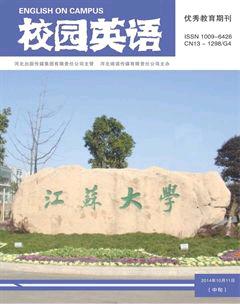How to Write Argumentation in English Persuasively
苏祎甜
Some problems should be worked out first
How to develop a good thesis statement?
Thesis statement is the sentence that we look early in an essay for a one- or two-sentence condensation of the argument or analysis that is to follow.It offers a concise solution to the issue being addressed and a brief summary of all explained reasons in the paper.
1)A strong thesis statement takes some sort of stand.A weak thesis statement fails to take a stand and the phrase that express stand shouldnt be vague.
2)Justifies discussion.A good strategy for creating a strong thesis is to show that the topic is controversial.
3)Expresses one main idea.A great many clear and engaging thesis statements contain words like because, since, so, although, unless, and however.
4)Specific, and will help you keep your paper to a manageable topic.
How to apply rhetoric into argumentation?
Aristotle, the Greek philosopher, in his Art of Rhetoric, defined 3 types of persuasive strategies, logos, ethos, and pathos.
logos is related to the word logic; it is the appeal to reason and to the intellect; Ethos means “ethics” in English and refers to the trustworthiness or credibility of a writer.Pathos is for emotion or feeling, and it refers to the ability of language to evoke feelings in us.(Gary Layne Hatch).
How to develop logical thinking in daily life and take it into use in argumentation?
1) An outline of the topic sentence shows a logic organization 2) Transitions from one idea to the next 3) Are your materials support opinions 4) The conclusion consistent to your purpose
What should I read contributing to writing
Here, reading before writing can be divided into 2 aspects: reading materials before a writing task; reading in a long run contributes to writing improvement.In a long run, if Im going to promote persuasion of argumentation, read some samples and comments from Guardian(if available), VOA news and Economists, etc.
AUTHORS SUGGESTION
Pre-writing
Step 1: Choose related materials
E.g.: If Im going to write an argumentation about Gun Control, I can search for related information through SE and D-Lib.Choose effective, high correlated and authority information and materials so that I can write credibly.
Step 2:Find background information and take down
Try to work out the origin and general ideas of the topic.Write down references, new words and expressions.
While-writing
Step1: Identify a thesis statement according to materials and my own understanding.(be concise and specific)
Step 2:Try to use logos, ethos and pathos to develop the essay.When appeal to logos and pathos, remember to refer to effective materials and care about audience.
Step 3:Pay attention to the logic: if the evidence can support the statements; if the structure constructive and understandable; if thesis can lead the content, etc.
Post-writing
Step 1:Check the logic again to ensure that they are reasonable.
Step2:Hand in and ask for suggestions, which aimed at making sure of being convincing and the ideas are acceptable.
Step 3:Further study on the topic.Write a concise conclusion of the essay writing.Spot the problems and make revising plans.
Tips for Daily Habits:
A.To develop logical thinking:
Download apps especially PUZ games to train logic
Look for math tasks on the Internet or from friends major in science.Work out a task every day.
Practice paragraphs writing.Try to be logic in every paragraph and then, develop discourse based on it.Always check logic through ask for advice from professors.
Always talk to friends major in science.Try to discover their thinking features.
B.To develop reading-based writing:
Form the habits of reading topical magazines and articles.Take down useful materials and new words as well as expressions.
Always think controversial opinions when comes to authors ideas.
Reference:
[1]Frank, Steven.I'll Show You My Underwear (or How to Tackle the Dreaded Thesis Statement).
[2]Stacy.Use Logic to Improve Writing.
[3]Corbett, E.P.J. Classical rhetoric for the modern student fourth edition.New York: Oxford UP, 1999.
[4]Princeton.edu. Princeton University.29 July 2012.
[5]Xu Qianhui How to Read English Literature in an Efficient Way 4 August 2012.

